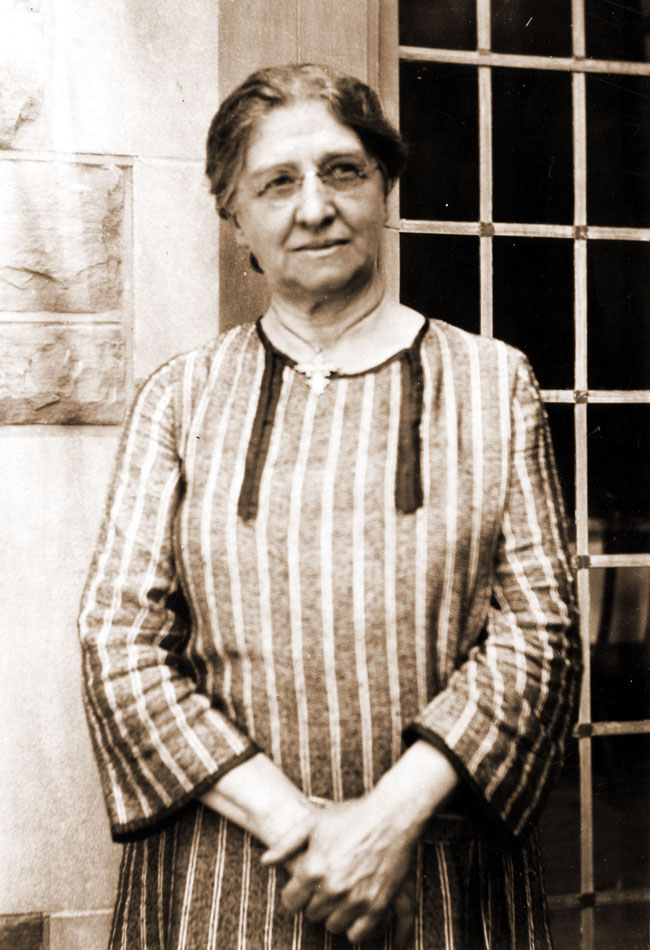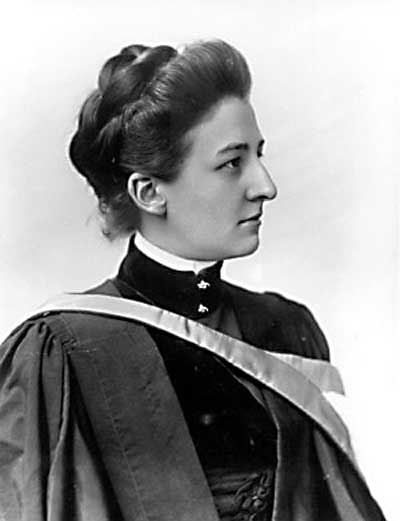
In 1912, when the McGill University Board of Governors appointed Carrie Derick as the Professor of Comparative Morphology and Genetics, she became the first woman in Canada to be titled full professor. As Canada’s first woman geneticist, and the founder of the Genetics Department at McGill, a google doodle illustration posted on her 155th birthday gives us some sense of her academic interests in botany and genetics. However, it does not reflect the tremendous importance of her contribution to human rights and especially to the rights of Canadian women.
Born Jan. 14, 1861 in Clarenceville, Quebec, Derick’s ancestry is United Empire Loyalist, Dutch, German and Scotch on her father’s side and English on her mother’s. Her grandfather, Philip Derick, was a United Empire Loyalist who settled in the Eastern Townships of Quebec, Canada, early in 1783. Derick’s first school was the Clarenceville Academy followed by teacher training at the McGill Normal School in Montreal. By all accounts she excelled in her early studies. A recent visit to Carrie’s family home in Clarenceville showed us how deeply admired and respected she was even as a child. A letter written by her mother, or perhaps an aunt, describes her studies and notes that “I expect that she will get to be a Miss Professor.”
Early work
Carrie Matilda Derick enrolled in McGill’s Faculty of Arts in 1889. By the time she retired from McGill 40 years later in 1929, she had widened the professional and occupational fields for Canadian women, improved the social and educational aspects of their lives, and helped them to gain political rights.
Her first job after graduation from McGill in 1890 (winning prizes in zoology, classics and the Logan Gold Medal in Natural Science) was teaching at the Trafalgar Institute for Girls. She simultaneously worked part-time as McGill’s first female botany demonstrator. In 1891 Derick started a Masters with Botany Professor David Penhallow. She finished her Master’s work in four years. A recent book about the history of the Biology Department at McGill cites this as “a remarkable feat considering she held down two jobs at the same time!”
Gender inequalities
After Derick received her MA in 1896, Penhallow recommended her as a full-time lecturer at the University, but the Board of Governors rejected this idea and offered her the lower rank position of “Demonstrator” at $750 a year. After seven years of lecturing, assisting Penhallow with his classes, researching and publishing, without any pay increments or offers of promotion, Derick wrote directly to Principal Peterson and was promoted to assistant professor in 1905 with a salary of $1,250.In the same year, Stephen Leacock was teaching Economics at McGill, while sidelining as an author. He received an annual salary of $3,000 in 1906. Accounting for inflation, that’s a difference of over $47,000 in annual salary in today’s money.

Derick began studying for her PhD in 1901 at the University of Bonn. However, despite having completed her research in 1906, she was not awarded the degree because the University of Bonn did not grant doctorates to women.
She returned to McGill and continued to work, teach and administer in the Botany Department. In 1909, when Penhallow became ill, Derick assumed his role as Chair. When he died a year later, she ran the department alone for the next three years, before officially being appointed a professor in 1912. The 1910-11 McGill Calendar lists Derick as one of 248 “Officers of Instruction.” Only seven are women. Carrie Derick is titled “Part-time Lecturer in Genetics” and the other five women are titled as either “Warden,” “Registrar,” or “Demonstrator.” These instructors taught a total of 893 students, all of whom were male. The class photos from each division show them proudly massed in front of their respective buildings, looking very dapper in bowler hats and waistcoats. There is one class photo for the Donaldas, the segregated class of women who were taught completely separately from the male students until 1921.
First Genetics education
In terms of her academic specialty, Derick created a course in “Evolution and Genetics” that became the first of its kind in Canada. Evolution had been an extremely controversial topic during her own undergraduate education, and genetics was still an emerging field. With funding from the Molson family a Chair in Genetics and a separate Department of Genetics were established in 1934.
Derick also published numerous articles on botany, including a booklet about McGill University’s trees in 1927, where she elaborates on the genetics of inheritance and also recommended landscape management strategies for the campus. Her interest in plants seems to have been dominant from an early age. During a visit to her family home in Clarenceville we found some of her botanical sketches still preserved intact. They show a high level of interest in the subject matter and are accurate depictions of plant features.
Pioneering advocate
Derick did not limit her observations and opinions to flora and genes. She publicly supported birth control, which was illegal in Canada from 1891 to 1969. She was one of the group of the McGill Alumnae who in 1891 organized the Girls’ Club of Montreal, which later was the parent of the University Settlement. She was a Life Member of the Red Cross Society; one of the organizers of the Serbian Relief Committee in Montreal (for which she received the Decoration of the Serbian Cross of Mercy) and during World War I took an active part in the various patriotic works of the Montreal Local Council of Women and of the Montreal Suffrage Association. She served as President in both groups, was a Member of Advisory Committee of the Montreal Women’s Liberal Club and the Convener of the Study Group of the Club. In 1915 she even dared to confront Quebec’s premier Sir Lomer Gouin’s position on birth control, after which he reportedly complained: “How she makes me blush, that old maid from McGill.”
Derick’s legacy in Canadian scientific history rests on more than her academic career. She was president of the Montreal Suffrage Association from 1913-1919, and in her “witty” public lectures she urged that the “domestic service” be given the status of a profession, as well as encouraged women to pursue careers in agriculture. In 1914, she supported Annie Langstaff, the first woman to graduate in law at McGill, in her unsuccessful bid to be admitted to the bar in Quebec. Along with Maude Abbott, McGill’s pioneer cardiologist and Curator of the Medical Museum, she founded and was a lifelong member of the National Council of Women.
Carrie Derick retired from McGill in 1929 because of poor health, and the University awarded her the honorary title of ‘Professor Emerita.’ She died in 1941. One obituary stated that Carrie Derick “had gained knowledge for herself, and . . . believed that her knowledge was a possession to be used for the service of mankind.”
To learn more about Carrie Derick, and other legacy women at McGill and in Montreal, join us at the Redpath Museum for Women’s Work: A theatrical celebration of Working Women in the Arts and Sciences, on March 26, 2 p.m. Women’s Work is a series of short plays about McGill’s Carrie Derick and Maude Abbott, Emily Carr and the Beaver Hall painters Anne Savage and Emily Coonan. Featuring actors Mary Burns, Colleen Curran, Sylvia Cymbalista and Jane Hackett. Get more information.

Hmm.. I didn’t know anything about Carrie Derick despite she was a great woman and pioneer in genetic education!!